The Innovative Netflix Business Model: From DVD Rentals to Original Content Creation
Netflix: Champion of Innovation
Netflix is a champion of innovation. Constantly looking for new ways to grow, iterate its business model and outperform its competitors. Always trying new things and jumping on new trends is what allowed Netflix, which started as a small DVD rental business, to become one of the main video content creators and distributors in the world with millions of subscribers. Netflix has changed the established landscape of movie and TV entertainment forever.
Innovation in Netflix Business Model
The very first innovation from Netflix was in the channel block of the business model. The founders, Reed Hastings and Mark Randolph admired Amazon for selling books online and wanted to do the same with some other items. At that time, they were searching for products that could be sold online and delivered via post, which were portable, durable, and desirable. VHS was the norm, but they figured that it was too heavy to be sent via post and too big to be easily stored in a warehouse. DVD, on the other hand, did fit the criteria. The only problem was that it was a totally new technology, barely released, but they went with it anyway. So both of these approaches, the delivery channel, and the format, were already very forward-thinking for that time.
To differentiate itself from the VHS renting competition even more, Netflix innovated its revenue and business model. Instead of a pay-to-rent-a-single-DVD model, Netflix tested subscriptions. You could rent as many DVDs as you want per month for a flat fee, and in addition to that, there were no due dates to return them and so no late fees, unlike traditional renting businesses.
Challenges and Resilience
Still, despite these innovations, things weren't going so well for Netflix. At some point, they proposed to get acquired by their main competitor called Blockbuster, which had a chain of physical shops for VHS and DVD rentals. Blockbuster refused the deal, and the funny story is that the whole company went bankrupt a few years later. In addition to these hurdles and this refusal, Netflix was also hit hard by the dot-com bubble. As many technology companies went bust, and stocks were falling down, Netflix had to fire two-thirds of its employees to stay afloat. Eventually, after 2002, the growth in subscriptions resumed, and the company went public.
Innovation in Delivery Channel
However, Netflix quickly understood that it would be a great idea to deliver a video directly online, although the internet speed at the time was too slow for high-quality content streaming. Once again, they were thinking about channel innovation for the delivery of their products, even though the infrastructure was not yet ready. At that time, they were still renting a lot of DVDs, which were their main source of income, but we all know what happened afterward, as CD and DVD sales started to fall rapidly. Normally that would spell the end of any company depending on them, but Netflix was forward-thinking enough, as usual, and the video-on-demand services allowed it to keep growing while its DVD renting business was falling. So that was once again channel innovation, as not only did Netflix offer streaming services through the internet, but they were also the first ones to make their content available on all devices, including PCs, smartphones, tablets, smart TVs, etc. So channel innovation brought Netflix up to a point where content is delivered online on every possible device.
Innovation in Content Creation
But by that time, competitors were growing and proposing the same offers, so Netflix kept innovating in other areas. The main change was the creation of original content. Netflix started to invest in series and movie creation by either acquiring independent creators or creating in-house. That added a new key activity to its business model, which is content creation. This is called vertical integration, where a company owns several parts of its value chain. As of today, Netflix creates original shows like "House of cards" or "Orange is the new black" and distributes them on its platform. Speaking of which, Netflix came up with several other innovations which fit into the value proposition block, starting with the video recommendation algorithm. This algorithm is very robust and attempts to suggest new video shows that you will like based on many criteria. This is extremely used to sort out content that individual viewers will enjoy out of thousands of different shows that exist in the catalog.
Changing User Habit
Also, Netflix is now releasing entire seasons of its original shows at once. Without making you wait weeks between each episode. When it comes to traditional TV, this weekly episode release is necessary to maintain a habit and make people watch advertising at prime times. But Netflix doesn't rely on advertising, so they don't need to do it. And for Netflix subscribers, the advantage is that they can binge-watch entire seasons at will without the waiting time between episodes. With this content creation and distribution, Netflix has some traditional business actors worried. Of course, it definitely changes TV. People go away from linear TV to on-demand video. At the same time, Netflix does vertical integration and produces original content. Which can change the balance of power between producers and broadcasting networks. Finally, with the release of original movies on small screens and not just TV shows, Netflix is turning movie theater businesses against it. It makes sense since movie theaters make money on the exclusive release of new films, which become available on DVD, streaming, or TV only much much later. This makes sense for Netflix which created a habit of disrupting delivery channels and skipping intermediaries.
Clash with the tradition
But it encounters resistance. Netflix movies are not allowed to compete in the official selection of the International Film Festival in Cannes for this exact reason. They don't release their movies in theaters. Cannes Film Festival is the most important event in the movie industry in the world and its official selection and the Palin Dog Prize are extremely prestigious but Netflix obviously won't go against its very own business model. So it will be interesting to see if this resistance will have a negative impact on it or not. This escalation and the tensions between Netflix and the fine crowd of the Cannes Film Festival really is a big deal. It's the typical confrontation between the incumbents and the industry disruptors. However Netflix should be careful because a big theater screen is not only a different delivery channel for movies, but it's also a totally different experience for moviegoers, compared to small screens like TV.
New Era
So will Netflix keep ignoring that or will it embrace it and keep following its logic. In this case, acquire and create its own movie theater experience, for example. It might sound crazy right now but it's not unrealistic given Netflix's innovation and vertical integration track record. So Netflix disrupted the sales and delivery channels of the industry many times over. The revenue and business model with subscriptions instead of one-time payments, it added innovative value propositions for its subscribers, relevant recommendations, and full-season releases and it expanded vertically by adding original content creation into its key activities. One thing is for sure Netflix keeps gaining subscribers. And it will continue to create new original content including series, movies, and documentaries. What will be its new major innovation is yet to be seen. But given how innovative that company generally is it's safe to assume that there will be surprises.
What Next?
Despite these challenges, Netflix continued to innovate and push the boundaries of the entertainment industry. For example, the company's investment in interactive content. In 2017, Netflix released "Bandersnatch," an interactive episode of the hit series "Black Mirror." The episode allowed viewers to make choices that affected the storyline, creating a personalized and unique viewing experience. This was a major step forward in the world of streaming content. And showed that Netflix was willing to take risks and try new things.
Another area where Netflix has been innovative is in its approach to international content. The company has made a concerted effort to expand its library of non-English language content. Recognizing that there is a global appetite for high-quality programming in languages other than English. In 2020, the Korean drama "Parasite" won the Academy Award for Best Picture. Marking the first time a foreign language film had won the top prize. This was a major milestone for international cinema. And Netflix played a significant role in bringing attention to the film and other non-English language content.
In addition to these innovations, Netflix has also made significant strides in the realm of diversity and inclusion. The company has made a concerted effort to increase representation both in front of and behind the camera. Recognizing the importance of reflecting diverse perspectives and experiences in its content. For example, the hit show "Master of None," created by comedian Aziz Ansari, features a diverse cast and explores topics like race, gender, and sexuality in a thoughtful and nuanced way.
Conclusion
All of these innovations and investments have paid off for Netflix. As the company has continued to see impressive growth in its subscriber base and revenue. However, this success has not come without challenges. As more and more companies enter the streaming space, the competition for viewership has intensified. Netflix must continue to innovate and offer compelling content in order to remain at the forefront of the industry.
Netflix has been a true champion of innovation in the entertainment industry. From its early days as a DVD rental company to its current position as a leading streaming service, Netflix has consistently pushed the boundaries and disrupted the status quo. Its investments in channel innovation, vertical integration, content creation, and diversity have all contributed to its success and have set the stage for continued growth and innovation in the years to come.





